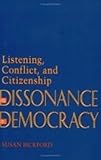The Dissonance of Democracy : Listening, Conflict, and Citizenship / Susan Bickford.
Material type: TextPublisher: Ithaca, NY : Cornell University Press, [2018]Copyright date: ©1996Description: 1 online resource (224 p.)Content type:
TextPublisher: Ithaca, NY : Cornell University Press, [2018]Copyright date: ©1996Description: 1 online resource (224 p.)Content type: - 9781501722202
- 302.2 23
- JA85 .B53 1996eb
- online - DeGruyter
| Item type | Current library | Call number | URL | Status | Notes | Barcode | |
|---|---|---|---|---|---|---|---|
 eBook
eBook
|
Biblioteca "Angelicum" Pont. Univ. S.Tommaso d'Aquino Nuvola online | online - DeGruyter (Browse shelf(Opens below)) | Online access | Not for loan (Accesso limitato) | Accesso per gli utenti autorizzati / Access for authorized users | (dgr)9781501722202 |
Browsing Biblioteca "Angelicum" Pont. Univ. S.Tommaso d'Aquino shelves, Shelving location: Nuvola online Close shelf browser (Hides shelf browser)

|

|

|

|

|

|

|
||
| online - DeGruyter Rhodes in the Hellenistic Age / | online - DeGruyter The Limits of Transparency : Ambiguity and the History of International Finance / | online - DeGruyter Forging America : Ironworkers, Adventurers, and the Industrious Revolution / | online - DeGruyter The Dissonance of Democracy : Listening, Conflict, and Citizenship / | online - DeGruyter Virginia Woolf as Feminist / | online - DeGruyter Kremlin Capitalism : Privatizing the Russian Economy / | online - DeGruyter Quintet : Five Journeys toward Musical Fulfillment / |
Frontmatter -- CONTENTS -- ACKNOWLEDGMENTS -- ABBREVIATIONS -- Chapter 1. LISTENING, CONFLICT, AND CITIZENSHIP -- Chapter 2. BEYOND FRIENDSHIP ARISTOTLE ON CONFLICT, DELIBERATION, AND ATTENTION -- Chapter 3. WHERE WE LISTEN AND ARE LISTENED To HANNAH ARENDT ON PLURALITY AND PUBLIC APPEARANCE -- Chapter 4. “T'HE GENUINE CONDITIONS OF OUR LIVES” FEMINIST THEORIZING AND POLITICAL ACTION -- Chapter 5. LISTENING AND AcTION RECONSTITUTING THE INTERSUBJECTIVE WORLD -- EPILOGUE -- REFERENCES -- INDEX
restricted access online access with authorization star
http://purl.org/coar/access_right/c_16ec
Although the role of shared speech in political action has received much theoretical attention, too little thought has focused on the practice of listening in political interaction, according to Susan Bickford. Even in a formally democratic polity, political action occurs in a context of conflict and inequality; thus, the shared speech of citizenship differs significantly from the conversations of friendly associates. Bickford suggests that democratic politics requires a particular quality of attention, one not based on care or friendship. Analyzing specifically political listening is central to the development of democratic theory, she contends, and to envisioning democratic practices for contemporary society.Bickford's analysis draws on the work of Aristotle and of Hannah Arendt to establish the conflictual and contentious character of politics. To analyze the social forces that deflect attention from particular voices, Bickford mobilizes contemporary feminist theory, including Gloria Anzaldua's work on the connection between identity and politics. She develops a conception of citizen interaction characterized by adversarial communication in a context of inequality. Such a conception posits public identity—and hence public listening—as active and creative, and grounded in particular social and political contexts.
Mode of access: Internet via World Wide Web.
In English.
Description based on online resource; title from PDF title page (publisher's Web site, viewed 26. Apr 2024)


